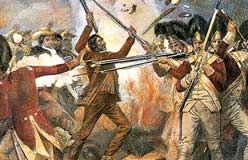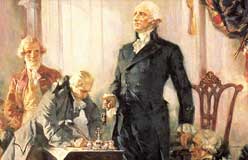If you sometimes don’t want to do what your parents tell you to do, you have an idea of how Great Britain’s 13 American colonies felt in the 1770s. Since 1607, people had been leaving the motherland to come to America for a variety of reasons.
These included religious freedom, economic gain, and a new life, among others. Many of these colonists had their differences with Britain. But most still considered themselves loyal subjects of the Crown.
Starting around 1763, however, after the end of the French and Indian War, conflict increased between Britain and the colonies. Great Britain had fought the war to drive the French from the continent and had come away victorious—but with huge war debts. Parliament (the lawmaking body of Britain) felt the colonies should help pay these war debts. The Americans resisted. They claimed they shouldn’t be taxed because they had no representation in Parliament. The British offered a plan to let the colonists elect representatives to Parliament. The colonists rejected that plan, believing they would never have enough votes to wield any real power. Conflict between the colonists and Britain escalated until, on April 19, 1775, armed revolt broke out.







